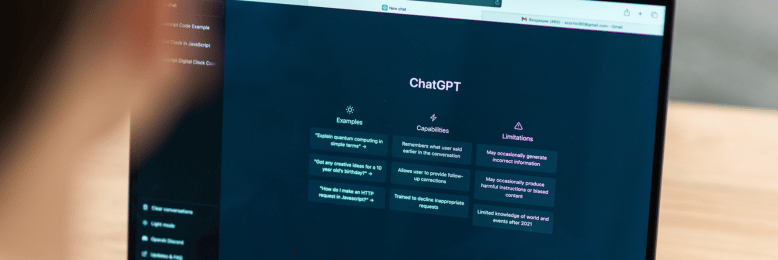ChatGPT's Privacy & Regulatory Issues: What It Means for Your Business
August 10th, 2023 | 4 min. read

It's all fun and games until you lose your privacy.
That's the sentiment many security experts and government authorities shared regarding OpenAI's ChatGPT. The revolutionary chatbot has been making waves worldwide with its remarkable ability to give semi-accurate responses that read like a human typed it. In fact, over 100 million people tried out its capabilities within the first month of its release.
While there have been many discussions regarding its potential to disrupt business sectors and creative jobs since then, there hasn't been enough talk about its impact on privacy and compliance. Considering the amount of private data the chatbot collects from users and the number of businesses wanting to leverage the new tech, it should come up more often.
Intelligent Technical Solutions (ITS) is an IT support company with over 20 years of experience helping hundreds of businesses secure their technology. In this article, we'll dive into:
- ChatGPT's main issues when it comes to privacy and regulations
- How OpenAI should address them, and
- The potential impacts it can have on your businesses if left unattended.

ChatGPT's Main Points of Concern
Leveraging new technology will always come with its fair share of risks and challenges. For ChatGPT, that means you could be running into the following issues:
Data Privacy Risk
ChatGPT relies on collecting vast amounts of data to train and fine-tune its model. That data often consists of user interactions involving personal or sensitive information. While it's true that it doesn't threaten your privacy more than any other free online resource, concerns arise from the potential mishandling of the data. For one, there have been many cases of employees typing sensitive company information into ChatGPT to aid them in performing their roles.
Regulatory Compliance Challenges
The widespread use of OpenAI's ChatGPT has sparked debates regarding regulatory and compliance considerations. In most cases, government authorities see AI as a new frontier that requires regulation. However, in some other cases, it is considered a threat to privacy. Either way, ChatGPT will see further regulations in the future when it comes to handling sensitive and personal information. Not to mention, OpenAI will have to conform to different compliance rules if they wish to continue operations.
Bias and Misinformation
Language models like ChatGPT learn from the vast amount of text available on the internet. It scours the world wide web to answer your questions. However, we all know the internet contains misleading information and outright lies. That means the answers the chatbot generates might not be the most accurate. In fact, there is also a risk that it could perpetuate biases that could lead to ethical issues.
How OpenAI Should Address the Issues
There is no single way to address privacy and regulatory issues. However, there are a few ways that OpenAI can improve its efforts to protect users. These include:
Developing Privacy-Preserving Infrastructure
OpenAI should prioritize developing robust privacy-preserving infrastructure. That includes implementing data anonymization techniques, secure data storage practices, and stringent access controls to safeguard user information. They should also encrypt data transmission to mitigate the risk of unauthorized interception.
Granting Users More Control Over Their Data
OpenAI should provide users with greater control over their data. This includes clear and comprehensive information on how their data is collected, processed, and stored. OpenAI should also implement mechanisms for users to easily review, modify, and delete their data. That will help the AI chatbot comply with many data protection regulations.
Implementing Bias Detection and Mitigation Efforts
OpenAI should actively work on detecting and addressing biases in ChatGPT's responses. That could involve conducting regular algorithmic audits, evaluating training data sources, and the development of mechanisms to identify and rectify biases. Another step would be to collaborate with external experts and research communities. That will help bring diverse perspectives and enhance bias detection capabilities.
Improving Transparency
OpenAI should strive for transparency. That includes providing clearer guidelines to users and developers about the system's limitations, potential biases, and the level of confidence associated with generated responses. Transparency fosters trust, enabling users to make informed decisions about interacting with ChatGPT.

How It Impacts Your Business If Issues are Left Unresolved
If left unresolved, the issues mentioned above can have very real consequences for your business, such as:
Legal and Regulatory Consequences
Failure to address privacy and regulatory issues can expose your business to legal and regulatory penalties. Non-compliance with data protection regulations such as the General Data Protection Regulation (GDPR) can result in substantial fines, legal disputes, and reputational damage.
Erosion of User Trust
In an era where privacy concerns are paramount, unresolved issues surrounding ChatGPT's privacy and biases can erode user trust. Users may become wary of engaging with businesses that utilize ChatGPT if they perceive a lack of transparency or a disregard for privacy protection. This can result in a loss of customer trust, diminished loyalty, and potential revenue loss.
Ethical Considerations
Businesses have an ethical responsibility to deploy AI technologies that align with societal values and ethical principles. If privacy and bias-related issues persist, businesses risk unintentionally contributing to the spread of misinformation or perpetuating harmful biases. This can lead to reputational damage, public backlash, and strained stakeholder relationships.
Ready to Protect Your Data Privacy?
While ChatGPT does hold potential for businesses seeking to leverage its capabilities, you should never overlook the dangers it could pose to your organization's privacy. OpenAI should address those risks by enhancing transparency, granting users control over their data, and focusing on privacy-preserving infrastructure.
On the other hand, if you’re already using the chatbot, you should also proactively address any privacy and regulatory concerns that may arise. That will help you maintain customers' trust and meet industry regulatory standards, allowing you to harness the benefits of the new technology.
At ITS, we are dedicated to helping business owners make intelligent decisions regarding technology so that they can make educated decisions for their organizations. Find out how we can help you adopt new technology safely and efficiently. Schedule a free IT assessment with one of our experts. Or, you can check out the following resources below for more info:
Mark Sheldon Villanueva has over a decade of experience creating engaging content for companies based in Asia, Australia and North America. He has produced all manner of creative content for small local businesses and large multinational corporations that span a wide variety of industries. Mark also used to work as a content team leader for an award-winning digital marketing agency based in Singapore.
Topics:
